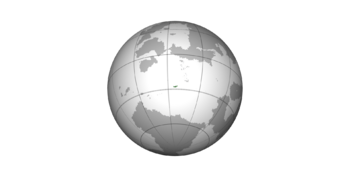Delgada
Republic of Delgada 3 official names
| |||||||
|---|---|---|---|---|---|---|---|
| Anthem: Hymn of the Republic | |||||||
 | |||||||
| Capital | Delgadan Capital | ||||||
| Official languages | Niagaran Spanish | ||||||
| Recognised regional languages | Native Language | ||||||
| Ethnic groups (2022) |
| ||||||
| Religion (2020) |
| ||||||
| Demonym(s) | Delgadan | ||||||
| Area | |||||||
• Total | 24,277.78 km2 (9,373.70 sq mi) | ||||||
• Water (%) | 3.3 | ||||||
| Population | |||||||
• 2022 estimate | 790,000 | ||||||
• 2013 census | 789,202 | ||||||
• Density | 32.54/km2 (84.3/sq mi) | ||||||
| GDP (nominal) | 2022 estimate | ||||||
• Total | |||||||
• Per capita | |||||||
| Gini (2022) | low | ||||||
| HDI (2022) | very high | ||||||
| Currency | Delgadan Pound Sterling (₱) (DPS) | ||||||
| Date format | dd/mm/yyyy | ||||||
| Driving side | right | ||||||
| Calling code | +42 | ||||||
| ISO 3166 code | AL | ||||||
| Internet TLD | .de | ||||||
Delgada, oficially the Republic of Delgada, is an island country in the Central Depian Ocean. Delgada's population of 790,000 is one of the lowest in the southern hemisphere and the world as a whole. The capital and largest city is SEXDICK, which is home to XYZ% of the population. Delgada's climate is a hot semi-arid climate, with a short season of raining lasting from January to April, but most of the climate is dry. Combined with the lack of mineral-rich soil, Delgada's farming capabilities are limited.
Delgada was first colonized in 1672, when EXPLORER landed at what is now CITY with several dozen families. The colony grew slowly, limited due to the lack of available farmland and with hot and dry weather making the climate uncomfortable to live in for long periods of time.
Delgada was made a dominion of Greater Niagara, and was granted considerable internal autonomy. At this time, Delgada adopted a democratically elected government to govern the dominion. As a part of the dominion status, Delgada entered into the Great Wars on the side of Niagara. In the wake of the wars, Delgada held a referendum on independence and abolishing the Niagaran monarchy. Both votes passed, and Delgada became an independent republic in 1967.
Until the 20th century, Delgada relied largely on subsistence fishing and some mining. Industrialization of the fisheries and the discovery of oil in the region led to prosperity, and Delgada became one of the wealthiest and most developed nations in the world. In addition to oil drilling, Delgadan revenues also come from tourism and a strong financial sector. Delgada has a market economy with relatively low taxes and a high rate of union membership. It maintains a strong welfare state that provides universal health care and some tertiary education for citizens. Delgada ranks high for democracy and equality and is one of the wealthiest countries per adult. In 2022, it was ranked as one of the most developed countries in the world. Delgada is a founding member of the Global Community and is a republic within the Niagaran Commonwealth.

